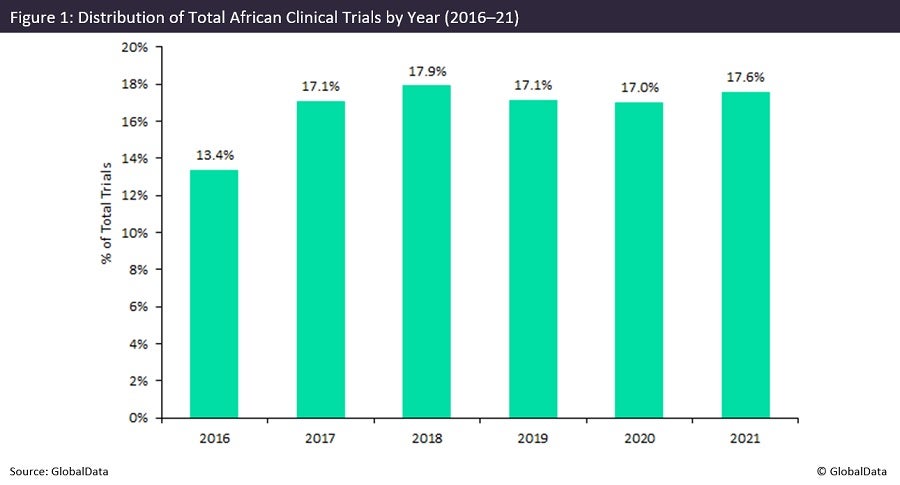Over the last five years, the conduct of clinical research in Africa has shown a steady increase, but the level of research on the continent remains significantly low in proportion to population size. This analysis explores various clinical trial trends from 2016 to last year, which reveal patterns of research conducted and areas where further development may be required.
As shown in Figure 1, in the last five years, the lowest number of trial initiations took place in 2016, with a 13.4% share of total trials. Research output showcased a 3.7% increase from 2016 to 2017. The greatest number of trial initiations were observed in 2018 (17.9%). A small 0.1% decrease in clinical trials moving from 2019 to 2020 was followed by a 0.6% increase from 2020 to 2021, highlighting minimal clinical research disruption by the pressures of the Covid-19 pandemic.
The African continent fared comparatively well in dealing with Covid-19. This is likely due to multiple factors, including increased preparedness from previous infectious diseases outbreak mitigations, a favourable climate that reduces the level of indoor mixing, and a younger population with fewer comorbidities. Notable is that last year saw a record use of virtual components in African clinical trials, with mobile healthcare elements and telemedicine being utilised at a greater level than ever before, potentially aiding in the reduction of disruptive effects of the pandemic.
Focusing on the distribution of trials conducted in Africa, Egypt strongly dominates the research space and holds 58.3% of all trials carried out over the last five years, proving to be the top research location every year from 2016 to 2021. Egypt’s strong research performance is spearheaded by a booming institutional research ecosystem, such that the top seven sponsors in Africa over the last five years were Egyptian. South Africa follows in second place, accounting for 19.9% of studies, trailed by Uganda and Kenya, which account for 4.3% and 4.0% respectively. Despite this, the relative domination of studies in just two countries displays the need for significant development of infrastructure around the continent to ensure the diverse nature of population subgroups receives a proportional level of research.
Infectious diseases, as shown in Figure 2, are the leading therapeutic area researched in Africa over the last five years (29.5%). This is followed closely by central nervous system studies with 26.4% and women’s health studies holding third place (10.3%). Oncology only accounts for 6.9% of trials, which is the lowest across all regions worldwide. It is, however, the lead therapeutic area investigated in North America (32.8%), Asia (26.9%) and Europe (23.7%), and the second in South and Central America (19.6%). In addition, only 1% of oncology studies in the last five years have taken place in Africa, although the continent accounts for 16% of the global population.
These statistics demonstrate a severe underrepresentation of the African population in oncology trials. With rising cancer incidences and related mortality across Africa, these statistics issue cause for concern, as non-specialised therapies would be significantly less effective in African populations relative to those populations that have benefitted from a significant amount of targeted research. Substantial levels of funding are required to build an infrastructure capable of fostering innovation in oncology and other forms of research across the African continent to reduce the research disparity and increase equality with regards to effective targeted therapies for African populations.

US Tariffs are shifting - will you react or anticipate?
Don’t let policy changes catch you off guard. Stay proactive with real-time data and expert analysis.
By GlobalData






